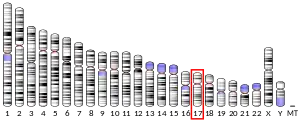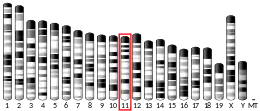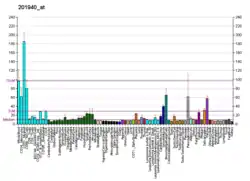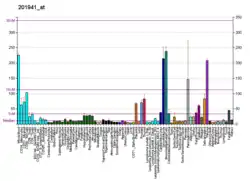| CPD | |||||||||||||||||||||||||||||||||||||||||||||||||||
|---|---|---|---|---|---|---|---|---|---|---|---|---|---|---|---|---|---|---|---|---|---|---|---|---|---|---|---|---|---|---|---|---|---|---|---|---|---|---|---|---|---|---|---|---|---|---|---|---|---|---|---|
| Identifiers | |||||||||||||||||||||||||||||||||||||||||||||||||||
| Aliases | CPD, GP180, carboxypeptidase D | ||||||||||||||||||||||||||||||||||||||||||||||||||
| External IDs | OMIM: 603102 MGI: 107265 HomoloGene: 999 GeneCards: CPD | ||||||||||||||||||||||||||||||||||||||||||||||||||
| |||||||||||||||||||||||||||||||||||||||||||||||||||
| |||||||||||||||||||||||||||||||||||||||||||||||||||
| |||||||||||||||||||||||||||||||||||||||||||||||||||
| |||||||||||||||||||||||||||||||||||||||||||||||||||
| |||||||||||||||||||||||||||||||||||||||||||||||||||
| Wikidata | |||||||||||||||||||||||||||||||||||||||||||||||||||
| |||||||||||||||||||||||||||||||||||||||||||||||||||
Carboxypeptidase D is an enzyme that in humans is encoded by the CPD gene.[5][6][7]
Function
The metallocarboxypeptidase family of enzymes is divided into 2 subfamilies based on sequence similarities: the pancreatic carboxypeptidase-like and the regulatory B-type carboxypeptidase subfamilies. Carboxypeptidase D has been identified as a regulatory B-type carboxypeptidase. CPD is a homolog of duck gp180, a hepatitis B virus binding protein. Transcript variants utilizing alternative polyadenylation signals exist for this gene.[7]
References
- 1 2 3 GRCh38: Ensembl release 89: ENSG00000108582 - Ensembl, May 2017
- 1 2 3 GRCm38: Ensembl release 89: ENSMUSG00000020841 - Ensembl, May 2017
- ↑ "Human PubMed Reference:". National Center for Biotechnology Information, U.S. National Library of Medicine.
- ↑ "Mouse PubMed Reference:". National Center for Biotechnology Information, U.S. National Library of Medicine.
- ↑ Riley DA, Tan F, Miletich DJ, Skidgel RA (May 1998). "Chromosomal localization of the genes for human carboxypeptidase D (CPD) and the active 50-kilodalton subunit of human carboxypeptidase N (CPN1)". Genomics. 50 (1): 105–8. doi:10.1006/geno.1998.5295. PMID 9628828.
- ↑ Tan F, Rehli M, Krause SW, Skidgel RA (Oct 1997). "Sequence of human carboxypeptidase D reveals it to be a member of the regulatory carboxypeptidase family with three tandem active site domains". The Biochemical Journal. 327 ( Pt 1) (Pt 1): 81–7. doi:10.1042/bj3270081. PMC 1218766. PMID 9355738.
- 1 2 "Entrez Gene: CPD carboxypeptidase D".
Further reading
- Andersson B, Wentland MA, Ricafrente JY, Liu W, Gibbs RA (Apr 1996). "A "double adaptor" method for improved shotgun library construction". Analytical Biochemistry. 236 (1): 107–13. doi:10.1006/abio.1996.0138. PMID 8619474.
- McGwire GB, Tan F, Michel B, Rehli M, Skidgel RA (1997). "Identification of a membrane-bound carboxypeptidase as the mammalian homolog of duck gp180, a hepatitis B virus-binding protein". Life Sciences. 60 (10): 715–24. doi:10.1016/S0024-3205(96)00642-X. PMID 9064476.
- Varlamov O, Fricker LD (Apr 1998). "Intracellular trafficking of metallocarboxypeptidase D in AtT-20 cells: localization to the trans-Golgi network and recycling from the cell surface". Journal of Cell Science. 111 ( Pt 7) (7): 877–85. doi:10.1242/jcs.111.7.877. PMID 9490632.
- Ishikawa T, Murakami K, Kido Y, Ohnishi S, Yazaki Y, Harada F, Kuroki K (Jul 1998). "Cloning, functional expression, and chromosomal localization of the human and mouse gp180-carboxypeptidase D-like enzyme". Gene. 215 (2): 361–70. doi:10.1016/S0378-1119(98)00270-4. PMID 9714835.
- Reznik SE, Salafia CM, Lage JM, Fricker LD (Dec 1998). "Immunohistochemical localization of carboxypeptidases E and D in the human placenta and umbilical cord". The Journal of Histochemistry and Cytochemistry. 46 (12): 1359–68. doi:10.1177/002215549804601204. PMID 9815277.
- Hadkar V, Skidgel RA (May 2001). "Carboxypeptidase D is up-regulated in raw 264.7 macrophages and stimulates nitric oxide synthesis by cells in arginine-free medium". Molecular Pharmacology. 59 (5): 1324–32. doi:10.1124/mol.59.5.1324. PMID 11306718. S2CID 10456432.
- Fan X, Olson SJ, Blevins LS, Allen GS, Johnson MD (Nov 2002). "Immunohistochemical localization of carboxypeptidases D, E, and Z in pituitary adenomas and normal human pituitary". The Journal of Histochemistry and Cytochemistry. 50 (11): 1509–16. doi:10.1177/002215540205001111. PMID 12417617.
- Kalinina EV, Fricker LD (Mar 2003). "Palmitoylation of carboxypeptidase D. Implications for intracellular trafficking". The Journal of Biological Chemistry. 278 (11): 9244–9. doi:10.1074/jbc.M209379200. PMID 12643288.
- Zhang H, Li XJ, Martin DB, Aebersold R (Jun 2003). "Identification and quantification of N-linked glycoproteins using hydrazide chemistry, stable isotope labeling and mass spectrometry". Nature Biotechnology. 21 (6): 660–6. doi:10.1038/nbt827. PMID 12754519. S2CID 581283.
- O'Malley PG, Sangster SM, Abdelmagid SA, Bearne SL, Too CK (Sep 2005). "Characterization of a novel, cytokine-inducible carboxypeptidase D isoform in haematopoietic tumour cells". The Biochemical Journal. 390 (Pt 3): 665–73. doi:10.1042/BJ20050025. PMC 1199659. PMID 15918796.
External links
- Human CPD genome location and CPD gene details page in the UCSC Genome Browser.
This article is issued from Wikipedia. The text is licensed under Creative Commons - Attribution - Sharealike. Additional terms may apply for the media files.






